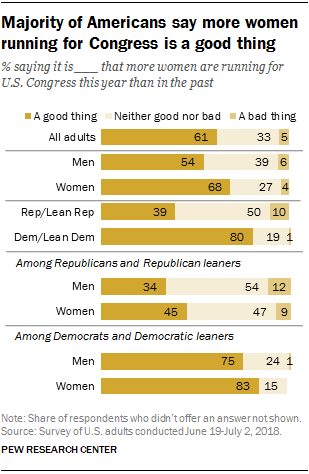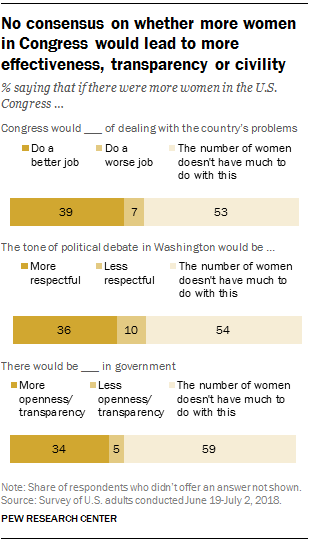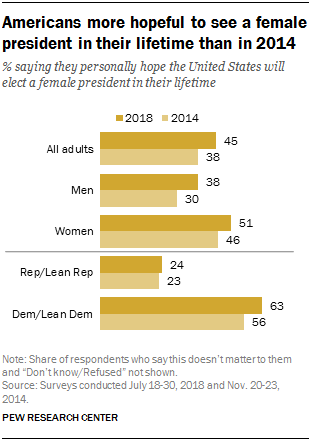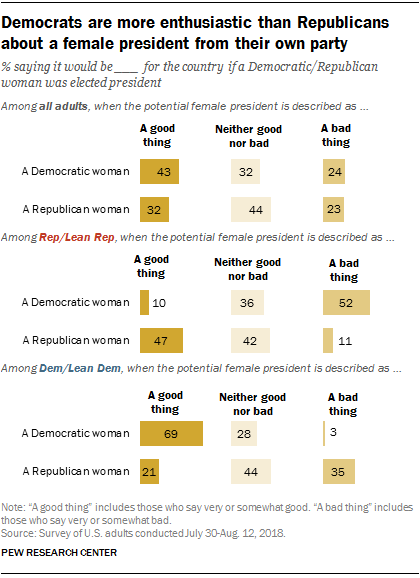 Women are running for Congress in record numbers this year, and most Americans say this is a good thing. But there’s little consensus among the public about how – or whether – things would change if more women were elected, according to a new Pew Research Center survey.
Women are running for Congress in record numbers this year, and most Americans say this is a good thing. But there’s little consensus among the public about how – or whether – things would change if more women were elected, according to a new Pew Research Center survey.
Looking beyond 2018, more than four-in-ten Americans say they personally hope a woman will be elected president in their lifetime, but there is some evidence that whether a potential female president is a Republican or a Democrat matters.
About six-in-ten Americans (61%) say it’s a good thing that more women are running for U.S. Congress this year than in the past, while a third say this is neither good nor bad. Just 5% see this as a bad thing.
Women are more likely than men (68% vs. 54%) to view the increased number of female congressional candidates as a positive development, but views are divided even more sharply along partisan lines. Eight-in-ten Democrats and Democratic-leaning independents say it’s a good thing that more women are running; about half as many Republicans and Republican leaners (39%) say the same. To be sure, more women are running on the Democratic side than the Republican side.
Among Democrats, large majorities of men (75%) and women (83%) say it’s a good thing that more women are running for Congress this year than in the past. Republican women are about evenly divided: 45% say this is a good thing and 47% say it’s neither good nor bad. Republican men are the least likely to see the surge of female candidates as a good thing (34% express this view, while 54% say it’s neither good nor bad).
 While most Americans say it’s good that more women are running for Congress this year, fewer than half say that, if there were more women there, Congress would do a better job of dealing with the country’s problems (39%); the tone of the political debate in Washington would be more respectful (36%); or that there would be more openness and transparency in government (34%). About half or more say that the number of women in Congress doesn’t have much to do with each of these areas.
While most Americans say it’s good that more women are running for Congress this year, fewer than half say that, if there were more women there, Congress would do a better job of dealing with the country’s problems (39%); the tone of the political debate in Washington would be more respectful (36%); or that there would be more openness and transparency in government (34%). About half or more say that the number of women in Congress doesn’t have much to do with each of these areas.
Women and Democrats – and Democratic women, in particular – tend to have more positive views of the potential impact of having more women in Congress. For example, 46% of women – vs. 30% of men – say Congress would do a better job of dealing with the country’s problems if more women were elected. Democrats and those who lean Democratic are about three times as likely as Republicans and Republican leaners to say this is the case (55% vs. 18%). Among Democratic women, 60% say Congress would do a better job of dealing with the country’s problems, compared with 48% of Democratic men, 25% of Republican women, and just 12% of Republican men who share this view.
When asked in an open-ended format why they think more women are running for U.S. Congress this year than in the past, one-in-five adults give responses that suggest it’s time for a change because the people who have been in charge, particularly men, haven’t done a good job; 16% attribute it to long-term societal changes that have led to more opportunities for women in general. Fewer point to President Donald Trump (9%), the #MeToo movement and increased reports of sexual harassment (4%) or Hillary Clinton (3%) as reasons why more women are running for Congress in 2018.
Democrats and Democratic-leaning independents are far more likely than Republicans and those who lean Republican to say more women are running for Congress as a reaction to Trump (15% of Democrats vs. 3% of Republicans). Among Democrats, this view is more common among men (20%) than among women (11%).
While opinions about what is motivating more women to run for Congress don’t vary much across age groups, women younger than 35 are less likely than older women to say it’s because people who have been in charge haven’t done a good job and it’s time for a change: 13% of women in the younger group point to this as a reason, compared with 28% of women ages 35 to 49, 26% of women 50 to 64 and 30% of women ages 65 and older.
A growing share of Americans say they hope to see a female president in their lifetime
 Americans today are more likely to say they personally hope the United States will elect a female president in their lifetime – 45% say this, up from 38% in November 2014. Half of the public says it does not matter to them if the U.S. elects a female president.
Americans today are more likely to say they personally hope the United States will elect a female president in their lifetime – 45% say this, up from 38% in November 2014. Half of the public says it does not matter to them if the U.S. elects a female president.
The shift in attitudes has come primarily from Democrats. In 2014, 56% of Democrats said they hoped to see a female president. In 2018 that number rose to 63%. Opinions among Republicans are unchanged since 2014; about a quarter say they hope to see a female president in their lifetime.
Women are more likely than men to say they hope this will happen – 51% of women say they hope to see a female president in their lifetime, compared with 38% of men who say this.
 Regardless of whether they hope to see a female president, a majority of Americans (68%) say they expect there to be one in their lifetime. That number is down slightly since 2014, when 73% of the public said they thought the U.S. would elect a female president in their lifetime. Still, the share who say they think this is likely to happen is higher than in 1996, when the question was first asked. At that time, only about half of Americans (54%) said they thought they would see a woman as president in their lifetime.
Regardless of whether they hope to see a female president, a majority of Americans (68%) say they expect there to be one in their lifetime. That number is down slightly since 2014, when 73% of the public said they thought the U.S. would elect a female president in their lifetime. Still, the share who say they think this is likely to happen is higher than in 1996, when the question was first asked. At that time, only about half of Americans (54%) said they thought they would see a woman as president in their lifetime.
Much of the change since 2014 has come from those ages 50 and older. In 2014, 67% in this group said they expected they would see a female president in their lifetime; in 2018 that number dropped to 57%. Among those younger than 50, the share who say they will see a woman as president is virtually unchanged from 2014.
Larger shares of Democrats than Republicans say it would be a good thing if a woman from their own party was elected president
 A separate survey by Pew Research Center finds that about four-in-ten Americans (43%) think it would a good thing for the country if a Democratic woman was elected president; 32% say this would be neither a good thing nor a bad thing, and 24% say it would be a bad thing for the country if a Democratic woman became president. When asked about the prospect of electing a Republican woman president, 32% say this would be a good thing, while 44% see it as neither good nor bad and 23% say it would be a bad thing for the country.
A separate survey by Pew Research Center finds that about four-in-ten Americans (43%) think it would a good thing for the country if a Democratic woman was elected president; 32% say this would be neither a good thing nor a bad thing, and 24% say it would be a bad thing for the country if a Democratic woman became president. When asked about the prospect of electing a Republican woman president, 32% say this would be a good thing, while 44% see it as neither good nor bad and 23% say it would be a bad thing for the country.
About seven-in-ten Democrats (69%) say a woman from their own party being elected president would be a good thing for the country. But when asked about the prospect of a Republican woman president, only 21% of Democrats say this would be a good thing; 44% say it would be neither good nor bad and 35% say it would be a bad thing.
Among Republicans, 47% say it would be a good thing to have a Republican woman as president, but a similar share (42%) see this as neither good nor bad. About one-in-ten (11%) say this would be a bad thing for the country. Republicans have far less positive views about the prospect of a Democratic woman being elected president: Just 10% say this would be a good thing while half (52%) say it would be a bad thing for the country.
Views about electing a Democratic or Republican woman president don’t vary considerably by gender, either overall or within each party.
Note: Three surveys were used in the analysis for this post. The full topline can be found here (PDF), and methodologies for them are below:
- Views of women running for Congress
- Views of electing a female president
- Views of Democratic/Republican woman president




